We all know that we need to take our dogs out for walks, but have we ever thought about whether it is appropriate for a small puppy to go out? If you let your puppy come into contact with the human world right after birth, you are worried that the germs outside will find your puppy and cause it to get infected; if you wait until you have completed three rounds of puppy vaccinations before you go out, you will miss out on the golden time for your puppy to be socialized and build up a sense of understanding of the world.
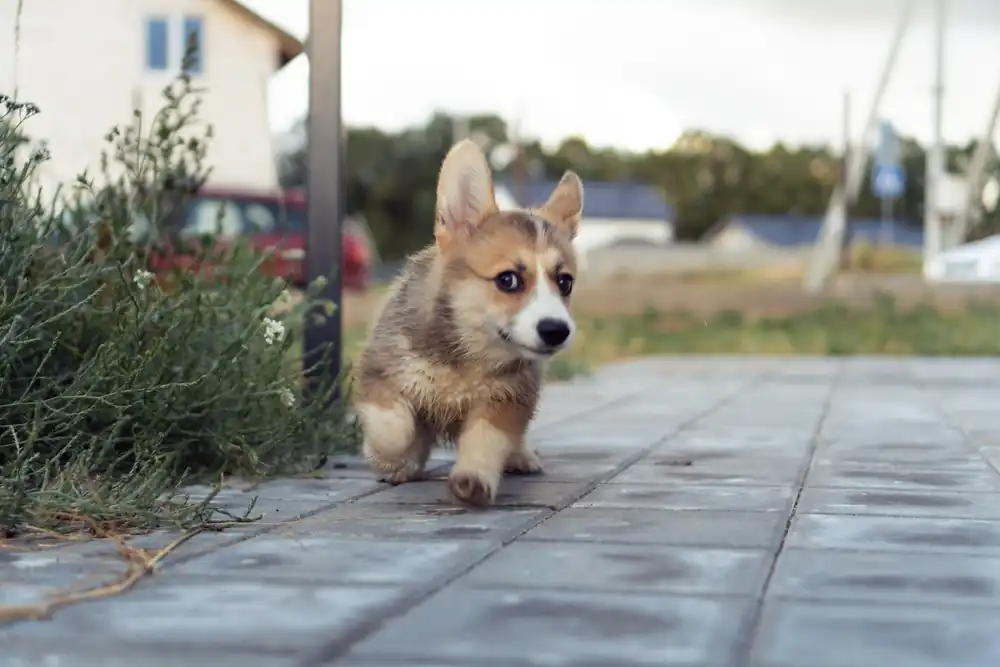
If you wait until you’ve had three rounds of puppy vaccinations, you’ll miss out on the golden opportunity to socialize your puppy and develop a sense of the world. So, what is the right time to take your puppy out for a walk? Today, we are going to analyze how old your puppy can go out, and the relationship between puppy going out and socialization. At the same time, we will further analyze what you should pay attention to when you take your puppy out of the house, so that you can reduce your worries when you take your puppy out of the house, and feel relieved when you go out to walk your puppy and have fun!
Puppy Socialization Procedures
Whether or not a baby puppy can leave the house and when it can leave the house has a lot to do with the puppy socialization process that affects a dog’s personality for the rest of its life! What is this socialization process? How long does it take? Here are the answers for all you fur parents out there:
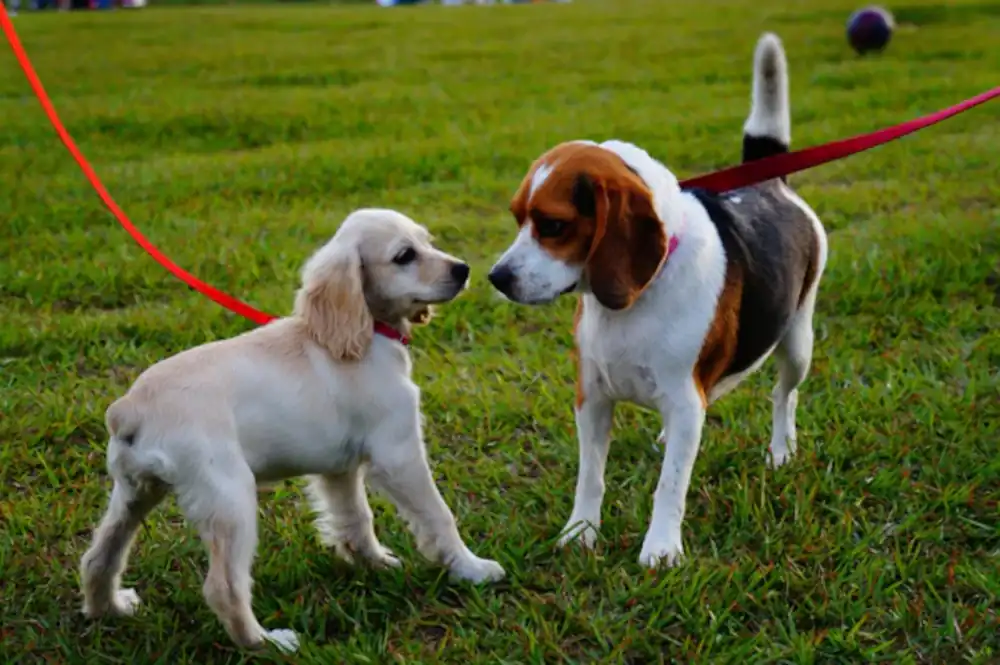
What is puppy socialization?
Puppy socialization is the process by which a new puppy becomes familiar with the world, develops an understanding of the world, and learns to get along with other dogs and the world. Through the process of puppy socialization, your dog will be able to adapt to the world more quickly, and will be able to adapt more quickly and without fear when faced with noises, other people, other dogs, other creatures, and even changes in the environment.
Therefore, taking your puppy out for a walk is an important way to socialize your puppy by letting him see the world, know what is outside your home, and then understand the activities of the world to help your puppy build his knowledge of the world!
When a puppy can be taken out to try socialization?
As mentioned in the introduction, if you let your puppy out of the house without vaccinations, your puppy will be susceptible to attack by parasites or other diseases; and if you take your puppy out of the house after three rounds of puppy vaccinations, you will miss out on the puppy’s golden period of socialization during the first three months of life. Most veterinarians now recommend letting your puppy out of the house when it is about 7 or 8 weeks old and has had its first puppy shots.
So, how do you socialize a puppy younger than 7 weeks old, before the first vaccination? It’s simple! You can start socializing your puppy at home, for example, by using mirrors, hair dryers, brooms, mops, and other furniture and furnishings to help your puppy learn about the world at home.
Why Socialize Your Puppy? 3 Reasons Why You Must Socialize Your Puppy and Take Your Puppy Outdoors
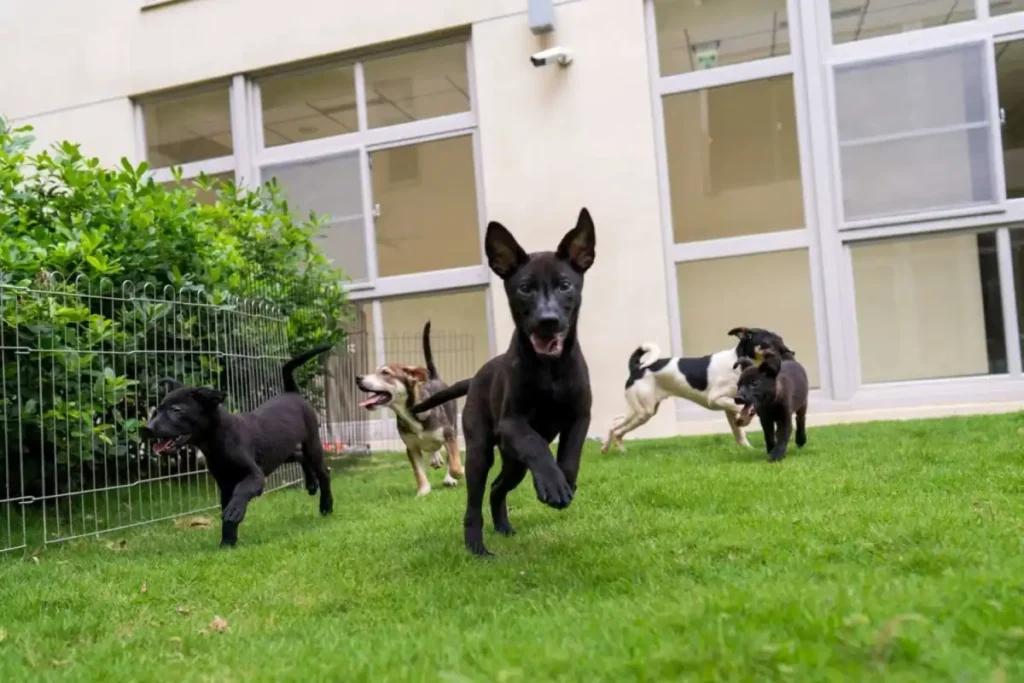
Why do puppies need to be socialized by taking them out for walks or something like that? If you don’t socialize your dog, what are the negative effects on your dog if you let him stay at home as a dog prince and princess under the protection of his furry parents? Here are 3 reasons why dogs need to be socialized:
Increase bonding between owner and dog
In the process of socialization of puppies, usually from the home furnishings, space to lead the dog to know, and then to walk around the home, and even take out of the house, ride together, to the pet restaurant meals. All of these activities will allow the owner and the dog to have a lot of interaction, which will build up the emotional connection between the owner and the dog, making the dog and the owner closer and more loyal.
Avoid future behavioral problems
If a dog is not socialized and does not know how to cope with the world, it will be easy for the dog to bark at people and other dogs, or even attack at will. They will also be prone to chewing on tables, chairs, paper, and cords in the home, causing all sorts of behavioral problems that can be a nuisance to their parents and others around them. If your puppy is properly socialized, he or she will learn to face the world in a friendlier way, thus reducing the chance of behavioral problems.
Developing Your Dog’s Ability to Face the World Independently
Most importantly, through the puppy socialization process, your dog will learn not to be afraid of the sounds of family and relatives talking, fans and blowers running, car horns, and other animals barking outside, and even to take an interest in these external objects. This prevents the puppy from being frightened by these unfamiliar things and needing to spend a lot of time calming down, and also allows the puppy to establish its own circle of life, so that it will not suffer from separation anxiety due to a short separation from its owner.
The 3 Stages of Puppy Socialization
After understanding the importance of taking your puppy out and socializing your dog, we’re going to walk you through the specific process of socializing your puppy! There are 3 stages in the socialization of a dog, and we are going to introduce you to the 3 stages of puppy socialization:
Stage 1: Newborn to 7 weeks old
Puppies at this stage are not recommended to be taken out of the house because they have not been vaccinated, and because they have just entered the world and are still at a stage where they have no understanding of the world. The key to socializing your puppy during this time is to make him feel secure and know that the world is a safe place for him, so please do the following two things:
🐕 Provide a good living environment: Feed your puppy with high quality dog food, create a safe environment for your puppy to sleep, and let your puppy sleep well, so that your puppy’s physiological needs can be met, and you can build up a sense of security by taking care of him in the details.
🐕 Getting to know the world from home: From the hair dryer, electric fan, mirrors and other appliances at home, as well as the sound of the family members’ conversations, your dog will initially get to know the world. You can also pick up your dog and look out the window to see what it looks like outside.
Stage 2: 7 weeks old ~ 3 months old
At this stage, the puppy not only receives its first puppy vaccination and begins to build up its body’s protective power, but also learns about the world it will face at the home of its furry parents, so it’s time to take the puppy out of the house and wander around the neighborhood! During this time, you can allow your dog to engage in the following activities:
🐕 Take your puppy for a walk around the house: Take your puppy for a walk around the house, to the streets and parks around the house, step on the floors with a different texture than at home, and listen to the sounds that you don’t often hear at home, so that your puppy can get to know more about the world.
🐕 Invite relatives to your home: You can also invite friends and relatives to your home so that your puppy can learn how to get along with unfamiliar people. If your friends or relatives have dogs, you can also invite other dogs to play with your puppy so that he can learn to get along with other dogs.
Stage 3: 3 months to 4 months old
At this stage, the dog has received three doses of puppy vaccines and is a little more familiar with the world outside the home. It is time to take your dog to farther places and explore the wonderful world more deeply! Here’s what you can do with your puppy at this time:
🐕 Take your dog to experience crowded environments: You can take your dog on public transportation such as buses and subways, or go shopping at department stores and pet restaurants with your puppy to show your dog a different part of the world. If you drive or ride your own car, you can also let your dog be your passenger and go out together!
🐕 Participate in dog socialization activities: Bring your dog to social training classes, dog gatherings, and other activities where he or she will have frequent contact with a large number of other dogs, so that he or she can learn to interact with others of his or her own kind in a friendly manner.
4 Tips for Socializing Your Puppy!
It takes at least 4 months for a dog to complete the socialization process. During this period, how can you help your puppy to complete the socialization process more quickly and without any obstacles, and become an adorable dog baby? We’ll share with you some tips to help your dog’s socialization process go more smoothly:
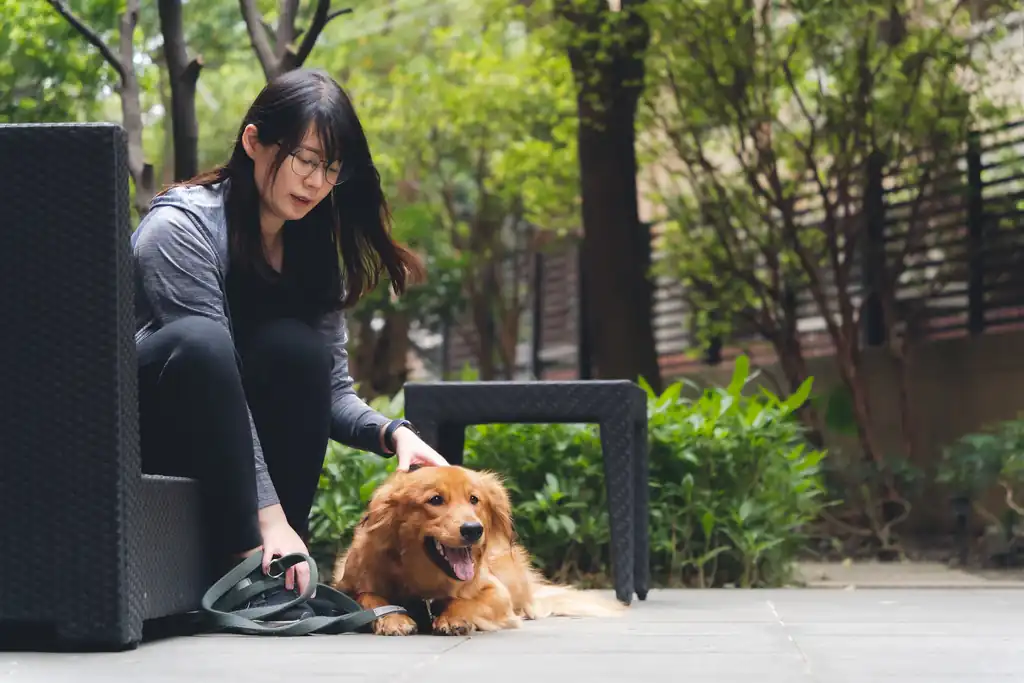
1. Take care of your puppy’s physiological needs
Dogs eat well, drink well, sleep well, and live in a safe environment in order to develop a sound mind, but also have the strength to go out for walks and experience all kinds of necessary activities for the socialization of puppies. Therefore, it is important to let your puppy get enough water, eat well, and sleep in a safe and undisturbed environment to help your dog build a sense of security in the world.
2. Help your dog establish principles and a regular routine.
Allow your dog to eat, drink, and go to the bathroom at a fixed time and place; require your dog not to go on the couch, jump on the bed, or chew on paper or wires; and stop your dog with a command or gesture when it is about to overstep the rules. Helping your dog to establish behavioral principles and a regular routine can help prevent future behavioral problems and help your dog build a bond with its owner and know what to do and when to do it.
3. Prepare snacks to reward your dog.
When your dog successfully completes walks and hitchhiking tasks, does not back off, barks or bites, or goes to the bathroom on time, you can feed your puppy some snacks to help your puppy build a positive cognition that “good food will come if you follow the rules and listen well,” which will make your puppy more willing to complete these tasks.
4. Let your puppy attend training classes
You can also let your dog attend dog behavior training classes, so that under the training of professional trainers and veterinarians, your dog will not only complete the socialization process, but also be able to completely kick bad habits.
Puppy Going Out: What Tools to Prepare? What to look out for?
Finally, here are some tips on what to look out for and what to prepare when taking your puppy out for walks and socialization tasks, to help your dog achieve socialization more safely:
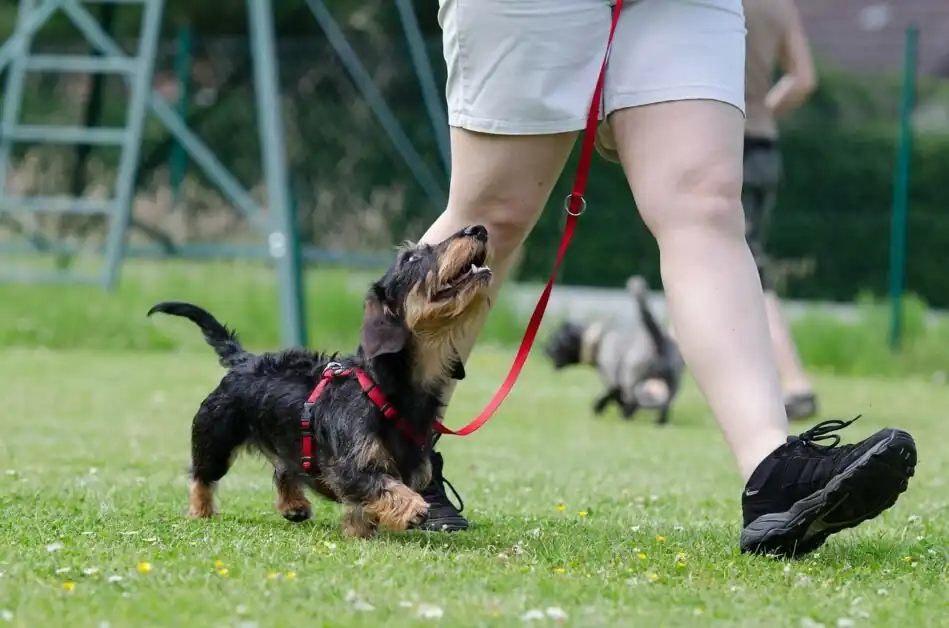
Prepare the leash and cart
Prepare the leash and tighten it to prevent the dog from wandering around when it is scared, and to signal the dog to move on when it stops. If your dog is a bit skittish, if you are taking your dog out of the house without a puppy vaccination, or if you are taking your dog on public transportation, prepare a stroller so that your dog can experience the world in a safer and more secure environment.
Keep your dog protected from pests and heat
Prepare your dog with bug sprays or oral medications to combat bugs, and wipe down your puppy’s pads with pet wipes after walks. In addition, dogs are prone to heatstroke in hot weather. Remember to prepare drinking water, sun hats and other anti-summer measures, and if you feel your dog is panting heavily, stop temporarily and let your dog go into the shade to replenish water.
If your dog reacts with fear, stop immediately.
Puppies are new to the world and will inevitably react with fear. If your dog is shaking, wailing, hiding, trembling, trying to run away, or even barking wildly, your dog is in a state of fear and you should pause immediately. Wait until your dog calms down before continuing outdoor activities such as walking.
Avoid contact with stray animals
Because you are not sure if stray dogs and cats have fleas, ear scabies and other infectious parasites that can affect your puppy’s health, avoid contact between your puppy and stray animals when you go for a walk, and let your puppy avoid cat and dog feces on the street to prevent your puppy from being invaded by parasites.
